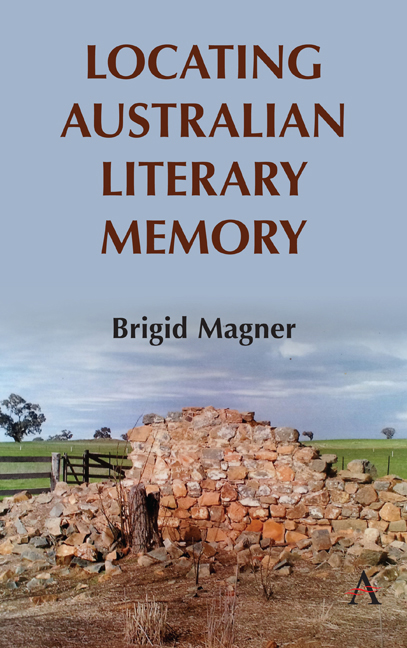Book contents
- Frontmatter
- Contents
- List of Illustrations
- Acknowledgements
- Introduction: Remembering Absent Authors
- Chapter One Adam Lindsay Gordon's Grave
- Chapter Two Joseph Furphy in the Riverina
- Chapter Three Henry Handel Richardson and the Haunting of Lake View
- Chapter Four Henry Lawson Country
- Chapter Five The Multiple Birthplaces of A. B. ‘Banjo’ Paterson
- Chapter Six Nan Chauncy's Sanctuary
- Chapter Seven Living Memorials: The Houses of Katharine Susannah Prichard and Eleanor Dark
- Chapter Eight Statue Mania: P. L. Travers and the Appeal of Mary Poppins
- Chapter Nine Kylie Tennant's Hut
- Chapter Ten The David Unaipon Monument at Raukkan
- Conclusion: Towards an Expanded Repertoire of Literary Commemorations
- Notes
- Index
Chapter Nine - Kylie Tennant's Hut
Published online by Cambridge University Press: 10 December 2019
- Frontmatter
- Contents
- List of Illustrations
- Acknowledgements
- Introduction: Remembering Absent Authors
- Chapter One Adam Lindsay Gordon's Grave
- Chapter Two Joseph Furphy in the Riverina
- Chapter Three Henry Handel Richardson and the Haunting of Lake View
- Chapter Four Henry Lawson Country
- Chapter Five The Multiple Birthplaces of A. B. ‘Banjo’ Paterson
- Chapter Six Nan Chauncy's Sanctuary
- Chapter Seven Living Memorials: The Houses of Katharine Susannah Prichard and Eleanor Dark
- Chapter Eight Statue Mania: P. L. Travers and the Appeal of Mary Poppins
- Chapter Nine Kylie Tennant's Hut
- Chapter Ten The David Unaipon Monument at Raukkan
- Conclusion: Towards an Expanded Repertoire of Literary Commemorations
- Notes
- Index
Summary
Kylie's Hut in Diamond Head, New South Wales, is an appropriately eccentric literary memorial for an unconventional person. Kylie Tennant's semi-biographical work The Man on the Headland (1971) centres around Ernie Metcalfe, the bushman who built the hut which she used as a writing retreat. Tennant donated the hut and the surrounding land to Crowdy Bay National Park in 1976. The hut is now part of the Kylie's Hut walk-in campground, near Kylie's Beach and Metcalfe's Track. This chapter will discuss the history of the hut, its representation in Tennant's writing, the circumstances surrounding its restoration and continued maintenance, and the ways in which the renaming of places after Tennant and Metcalfe serves to obscure the long, continuous presence of Traditional Owners.
Tennant (1912– 1988) was the author of nine novels as well as short stories, plays, journal articles, critiques and biographies, in addition to writing for children. She is noted for her social realist studies of urban and rural working-class life from the 1930s, which began with Tiburon (1935) and included Foveaux (1939), named after a street in the slums of Surry Hills. Tennant's Depression novels The Battlers (1941) and Ride on Stranger (1943) won her the most attention, mostly because of her unusual method research. For The Battlers, she lived the life of an itinerant looking for work, jumping trains and hitching rides all over the outback, enduring hardships on meagre rations. For Foveaux she spent a year living in a Surry Hills slum in Sydney, sleeping in rooms lined with newspapers and infested with bugs as she gathered background material. In the early 1950s, she dressed up in shabby clothes, had herself arrested for drunken disorderly behaviour and was sent to Long Bay Gaol, as research for her book Tell Morning This (1967), which was first published in abridged form as The Joyful Condemned in 1953. Tennant even worked for a time at shipbuilding so that the tools and terms of the craft would be familiar when she wrote Lost Haven, and travelled with beekeepers as research for The Honey Flow. This lived research demonstrates her intense commitment to understanding the lives of working-class people and her ongoing concern for social justice.
- Type
- Chapter
- Information
- Locating Australian Literary Memory , pp. 173 - 188Publisher: Anthem PressPrint publication year: 2019



